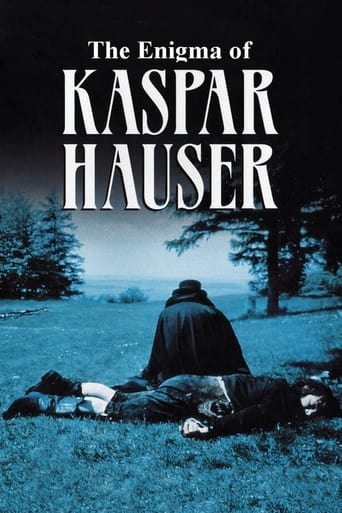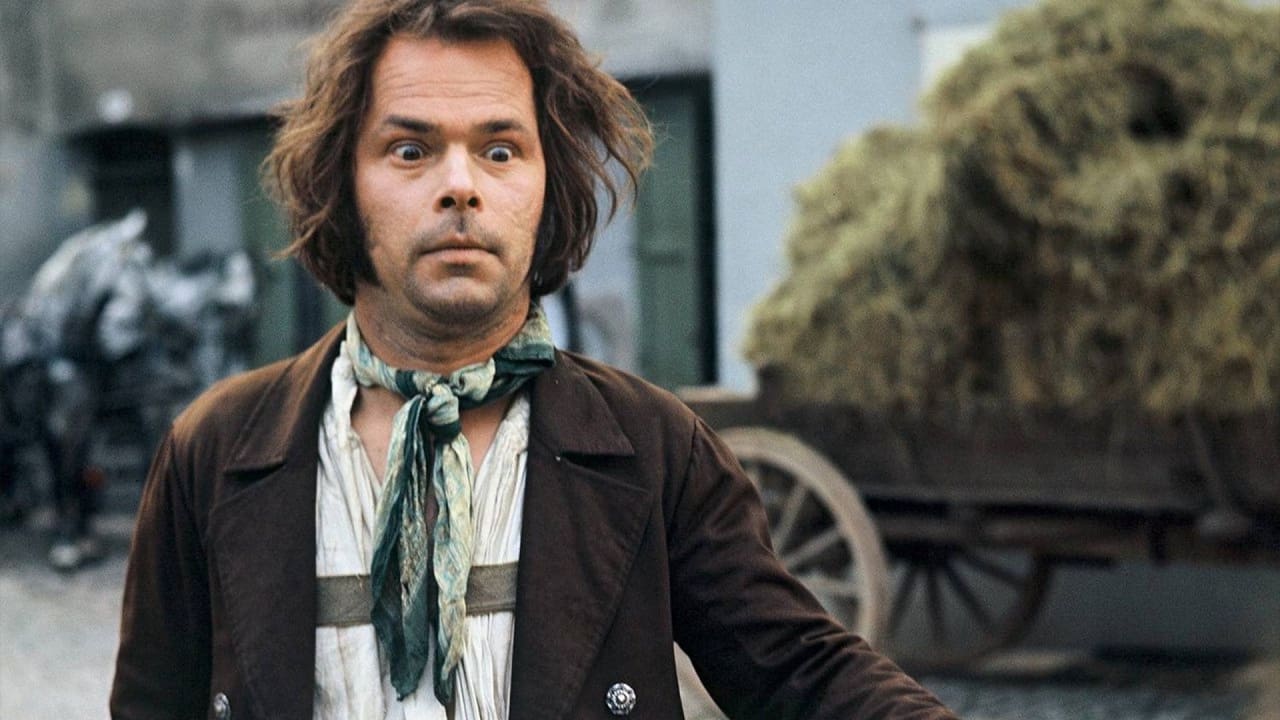Kirpianuscus
a trip more than a movie. pure Herzog. and the best Kaspar Hauser. one of films who explores the shadows of a myth with admirable precision and fascinating grace. the mystery, the fear, the colors of atmosphere are basic tools. but the work, scene by scene, becomes a masterpiece. for the exploration of feelings of a small characters who becomes a symbol. for the wise use of ambiguity. for the force of image and the exploitation of each nuance. a film for a special public, who knows the art and the science and the vision of Werner Herzog. each as expression of genius to propose unconventional actors in emblematic roles. a film about Kapar Hauser, who becomes large open window to the fascinating job of Bruno S..
Leofwine_draca
A great little Herzog movie. I remember seeing the first half of this on TV many years ago. I was late at night and I fell asleep, but always wanted to know what happened. Something about the acting of Bruno S. haunted me - I had to know the full story.I'm lucky enough to have just seen the whole thing for the first time, and for me this is a real classic. It's based on the true story of Kaspar Hauser, a real-life enigma of the 19th century. He was apparently brought up locked in the room for his childhood and teenage years, with little human contact or indeed contact with the outside world. He was then dumped and left to fend for himself in an alien society.Inevitably the story draws comparisons with the likes of THE ELEPHANT MAN and it's clearly a labour of love for Herzog himself, who had tackled similar themes of isolation in his documentary LAND OF SILENCE AND DARKNESS. It's a stunning movie - heartfelt, full of emotion and sadness. The wonderful cinematography is a real asset, but it's Bruno S. who makes the film for me - he's completely sympathetic in the leading role. THE ENIGMA OF KASPAR HAUSER is one of those quiet, unassuming movies that grows on you all the time, and far more memorable than many a noisy, brash Hollywood outing. In fact, I'd go so far as to call it unforgettable.
bob the moo
This is a difficult film in my eyes. On one hand I feel the pressure to love it because it is Herzog and therefore brilliant; those confused by what I mean need only scan some comments here to see those that feel the same way but perhaps didn't see the need to question it. On the other hand it is a film that moves very slowly and seems to have been much more about the process than it was about making a flowing film or telling a story. The plot here is based on the true story of a man who reportedly was raised in a cellar and then suddenly thrust onto the world without any reason or introduction. In an almost childlike state, everything is new and he perceives the world with no accepted wisdom or social filter.This situation clearly fascinates Herzog because this is essentially the whole film and the vast majority of scenes can be summed up thus. The actual story of what happens to Kasper is shown but it almost has no interest in the who's or why's, unlike those who think they have a nice neat explanation for everything. Viewing the film I did struggle with different illustrations of essentially the same thing and in terms of viewing it coldly, it was often rather dull, deliberate and slow. This is rather offset though by the two key men in the film. The first is Bruno S., an oddity himself apparently and he certainly captures the otherworldliness of the character really well. The script gives him an engaging view on things and he delivers it convincingly. The second and more important man is Herzog himself. Although I did not always share the extent of his fascination with the ideas and concepts herein, I was interested in the way he looked at them and the way he delivered his film. Not all of it worked for me, some of it was too slow, some of it was jarring and some of it was frustrating, but I found his process interesting. I have watched several of his films of late and while I do not always like his films, I love that his fingerprints are all over them and it was seeing these that made this film better.I would have liked to have loved this film but frankly did not. In terms of the film itself I probably liked as many aspects of it as I disliked but fortunately I was engaged by the minds and process behind the film and I think while it does not read that if you like Herzog you'll like this film, I would say that you will like Herzog's presence in the film.
robert-temple-1
This remarkable, one is forced to say unique, film, by the iconoclast Werner Herzog, raises many disturbing and fundamental questions about the human species and the constructs known as 'society' or 'societies'. (Margaret Thatcher once famously pronounced: 'There is no such thing as Society.') Here we have a brilliant evocation of events which really happened in 1828 in Germany, when a young man who claimed to be named Kaspar Hauser suddenly appeared one morning in a town square. No one knew him. He held a note in his hand written by someone else but was himself barely able to speak more than a few phrases which he had been taught during the many years (apparently the whole of his life) when he had been held captive in a dungeon. Who was he? Where did he come from? Why had he never met anyone other than the unknown older man who had held him a captive, and who was never identified? How could he never before have seen a tree, a town, a house? Why did he not know how to converse or interact with other people? How could he be so removed from everything which we identify with what we call society, and hence with 'being human'? This leads to questions such as: what does it mean to be human? And can one be human if one is outside 'society'? In other words, is a human in isolation 'human' or not? And if a human in isolation is not 'human', then what does 'human' really mean? For it can clearly no longer have a biological definition, but involves imponderables which are ill-defined at best and may even be beyond definition. In other words, the enigma of someone like Kaspar Hauser challenges all of our cozy assumptions about ourselves. And this is what the film is really about, for the absurdities of 'society' in 1828 Germany are ruthlessly and relentlessly exposed, with the implication being that all 'societies' of whatever date and place are perhaps equally absurd. And so where does this leave 'the human condition', or is there even any such thing? Herzog throws down the gauntlet to challenge all of us, and the responses to that challenge have in the four decades since largely consisted of pathetic and unfocused whimpers or evasions. One wonders to what an extent this film by Herzog was inspired by the Francois Truffaut film which appeared four years earlier, L'Infant SAUVAGE (THE WILD CHILD, 1970), which was also based upon a true story (of the late 1700s), but which was a far gentler and less provocative film than the frontal assault on us by Herzog. Truffaut's film is thoughtful and troubling, but Herzog's film is a manifesto and a direct challenge. Truffaut was holding a polite conversation with us, but Herzog was raising a banner and making a proclamation. In casting the role of Kaspar Hauser, Herzog made the inspired choice of the man known only as Bruno S., who had in real life been savagely mistreated when young and who shared certain characteristics with the character in the film. The result is the most astonishingly convincing portrayal of Kaspar Hauser. He does not look at or interact 'normally' with people when conversing with them, because he has never been conditioned to do so. He talks to them while staring blankly in front of him. In fact, the silent acceptance of contact amongst animals with each other more nearly resembles his behaviour than the human habit of looking at and showing facial reactions to each other when interacting, It is not the habit of dogs to look at each other as much as they look at us. They know they have to look at us because that is how we interact, but with each other they show what to us seems greater attentional indifference, despite the fact that 'dog language' is so strongly reliant upon facial, nasal, and eyebrow twitches, lacking as it necessarily is in words. So the apparent casual indifference which animals so often appear to us to show towards one another, being so alien to our own behaviour, is what Kaspar Hauser shows so clearly. All around him, meanwhile, frantic people behave increasingly like lunatics, trying to teach him the correct religious dogmas, the proper forms of dress and behaviour, the rigourous forms of logic, and other wholly inappropriate things. The film shows us a mad society and a sane but utterly alien outsider hopelessly unable to get through to one another, lacking all possibility of mutual comprehension, and living side by side as it were on different planets. Herzog wholly succeeds in holding this mirror up to us and asking: who and what do we think we are?


 AD
AD



